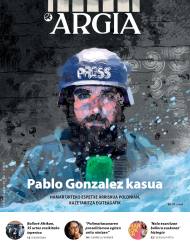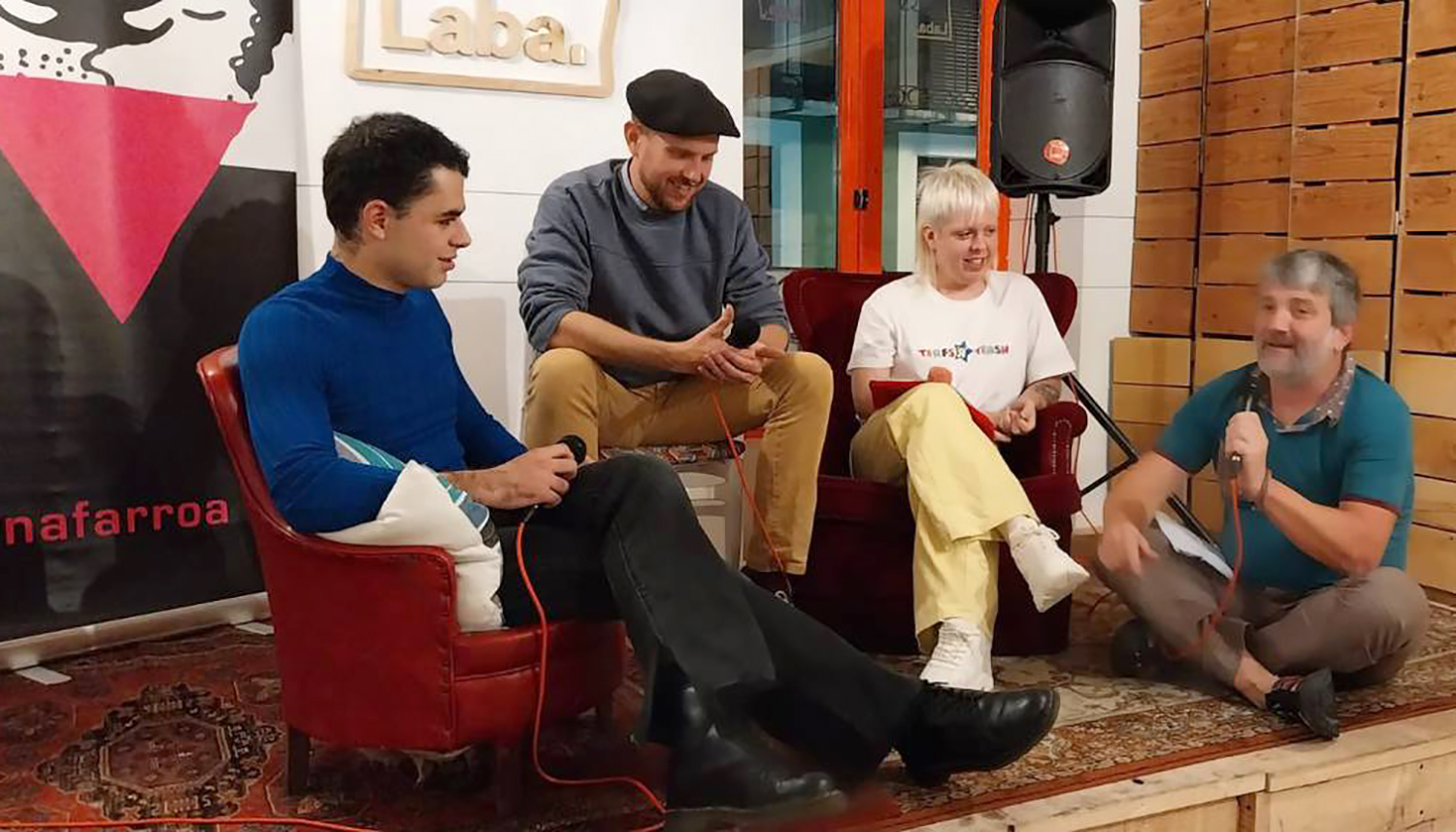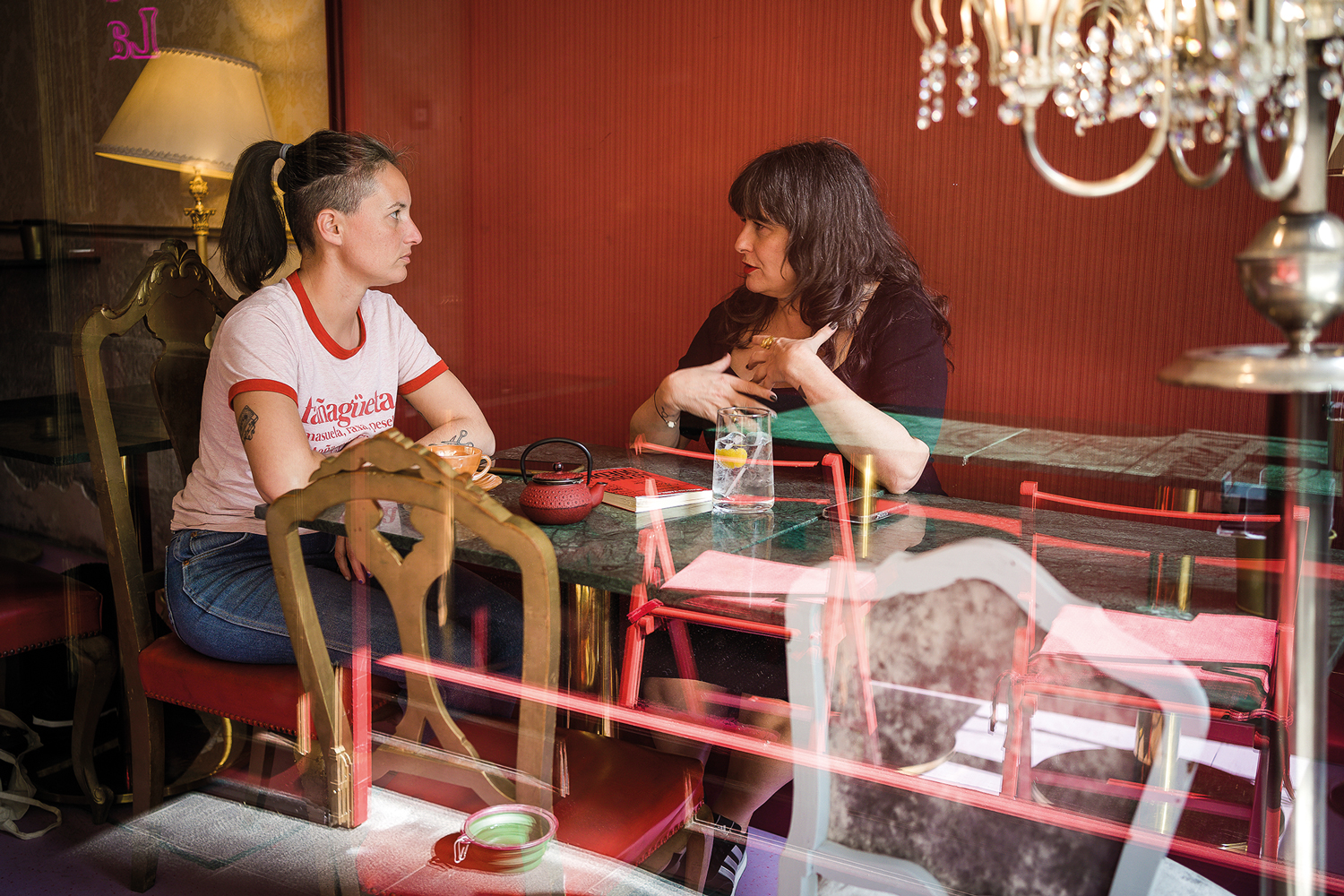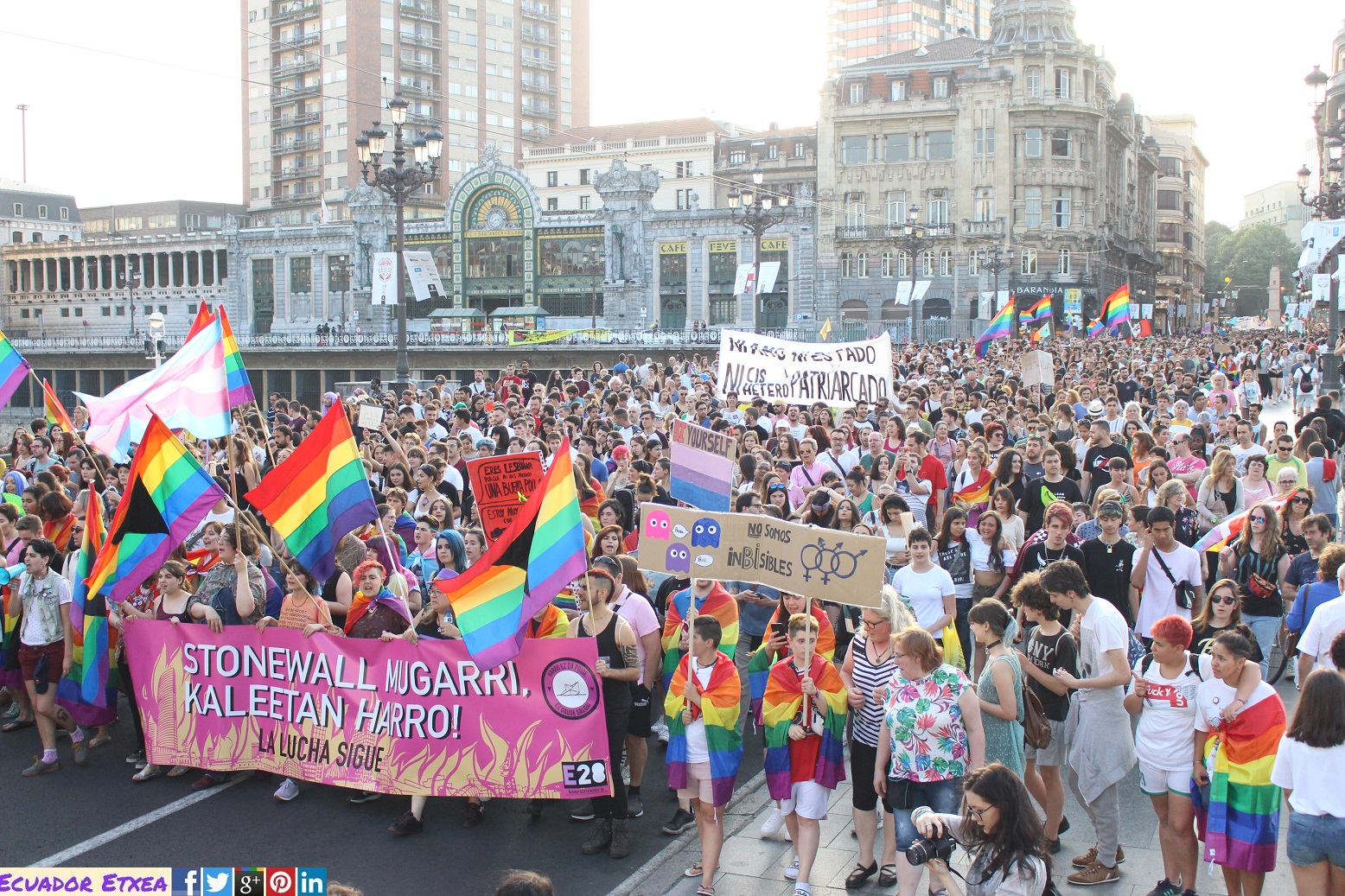"It's very important to play with language when words are missing"
- Philologist Amaia Alvarez Uria and journalist June Fernandez have joined the glossary, contributions, experiences and creation pieces on Zinegoak's website. The contents and reflections embodied in them have been disseminated through bertsos programs and talks/recitals. It is also about bringing two worlds, the lesbian community and Basque culture, which have been very separate for years. The next is a conversation between two ARGIA collaborators.
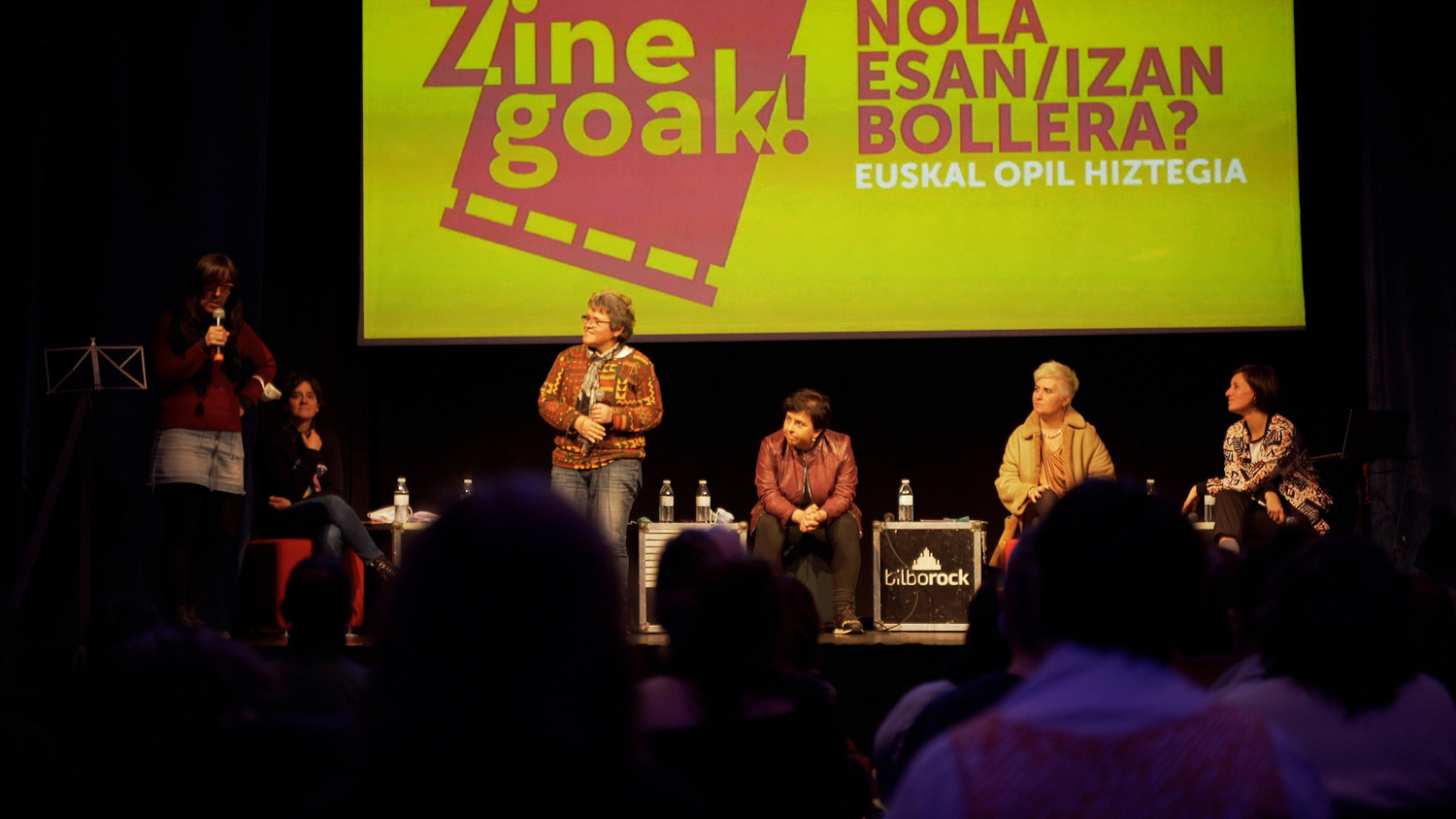
June Fernández: Our initial intention was to create the lesbian equivalent of the Gay Dictionary by Aitor Arana. In the first phase of the project we collected the words and their explanation through the participatory process, genealogy, reflections… What would you highlight from Words and Contributions?
Amaia Alvarez Uria: As a philologist, I've been concerned for a long time about the use of language and discourse analysis from a feminist and lesbian perspective: what realities appear in the words we use, which do not and why. The process of creating the Boller glossary has been very nice. We have confirmed the first hypothesis that we operate with Spanish-language loans, that is, that most people use the word moulding. In any case, it was a surprise to see that people living in Euskera tend to create and play.
Fernández: I didn't know the cuckoo of the Gipuzkoans. Bertsolari Eli Pagola explains that it has spread in the hostel of the Kuku district of Azkoitia by conducting camps in EHGAM. I found it in the program of the Bollurriak meetings (kukupoteo, kukufesta) and in the motto of the cyclotourist march ARRA BIRA TRANSMARIBIBOLLO: “Kuku turns!” Also, the P.E.R.I. I would highlight the bolloproperty created by the group and the lesbian using bertsolari Maider Arrangi among her friends. On the contrary, there has been no term used historically in peoples; in addition to tortilla and marimutiles, no one has any other reference. This demonstrates the taboo and invisibility that has surrounded lesbianism.
Alvarez: On the other hand, those of us who think about language have the terms proposed, but we have seen that they have sometimes been far from the community.
Fernández: It is true that proposals such as peat or grass have not been very successful. He has worried me, because the point of view of our project can be associated with transparency…
Alvarez: There is some social pressure to use clean Basque. The best Basque is the one who is used, the one who is alive. When we have asked what words they use to name identity and bullfighting practices, often the reaction of the interviewees has been a sort of mea culpture: “It’s true! We do not use Basque words!” It wasn't about taking a picture of reality. Loans have always been used in Basque and all languages.
Fernández: In any case, Itxaro Borda has written a story for the project in which he reminds us with irony that the bollera is a term of Hego Euskal Herria. I did not know the French gouine, used by the Iparralde bollers.
Alvarez: Itxaro Borda's story is beautiful because it has crossed social concern with linguistics, as it always does. It has brought together two protagonists: Southern Bollera and northern gouine, which defend each term. It has been very nice to address the issue from different points of view, not only from the north or from the south, but from the erdal capitals and/or Basque respiratory areas, different generations… Some words work between those of us who are about 40 years old, but not between 20.
Fernández: Young women don’t understand the question...
Álvarez: They understand, they understand, but they don't use it. On the contrary, from Luz Lertxundi de Pasaia he told us that he has used among his friends “the guild” to express the same.
Fernández: You have invented for the project the Scholar (to say heterocurious in Spanish) or marioker (like queer in English). The writer Ana Jaka dares with sexual practices and intermingles and creates potomingus. It's a fun exercise, but what's it for if nobody's going to use it afterwards?
Alvarez: Doubt or mistrust has arisen when we've created words through play and not sufficiently focused on the sense or mechanisms of language. For example, when we proposed the grass, the collective Lumatza used it on t-shirts (“feminist lawns from Navarra”), but not all the members of the group were in favour. Maybe that word wasn't the most appropriate, but I think play is very important when words are missing. Then we will see the path that each word will take, whether it will be accepted or not, whether it will like people… A few years ago, Kike Amorraniz and Asisko Urmeneta made a project to collect and create youth language and defended the legitimacy of inventing words. One last example: Fermintxo Zabaltza had a great challenge in returning the Stonebutch blues. I recognize that when I saw the blues title of a great Marimutil, I didn't like it, because it didn't have the same force or the same meaning. However, I found it very nice to see that the Basque painters have started to use great marimutiles. So chapeau, Fermintxo!
Amaia Alvarez Uria: "Itxaro Borda has for many years been the only leader in the Basque literature. With the generational change, Kattalin Miner and Danele Sarriugarte appeared. It has been very nice to discover that the Basque literary bullets have appeared to us in poetry"
Strategic Identities
Fernández: According to Ana Jaka, importing words means importing identities. Perhaps those who come to us from other languages do not correspond to our realities, right? For example, I would say that the dynamics of butch-femme desire are more diffuse, because the so-called Basque pen predominates; most of the baskets of our generations have deconstructed femininity.
Alvarez: Yes, the first thing you do when a Basque moulding is to cut your hair! With the generational change they become increasingly femme; likewise, Uxue Alberdi pointed out among the Bertsolaris women the jump from drag king to the archetype of dolls. The authors of the book Barbarisms queer emphasize the need to interpret the terms that transfeminism has taken from English. Members B.A.L.A.ko do so constantly: they adapt the universal to the local reality.
Fernández: For example, the announcement by Laboral Kutxa to explain the concept of pinkwashing (use the photograph of marriage between two girls to sell mortgages). Oiga, this year we asked the interviewees how they experience the lesbian relationship with Basque identities. I would like to give you the question.
Alvarez: I'm over 40 years old, my trajectory is long. At first, the ambient bilbaíno was Castilian speaking and in the Basque world there were still no public baskets. A generation has been needed to bring the two worlds together. At Deusto's youth venue, I saw the campaign "Liberating Sexuality," which was a milestone, I think it was Jarray's. There was a kind of explosion: all the girls started to bind. Kids aren't that much. I remember a guy's comment. “Well, this is a fashion, it will happen to you.” Thus, the bilbain artist Ainhoa Güemes points out that Jarrain was lesbian. Today, the new generation has no ambition, but it has applications and Bollurria, other ways of being together perhaps less immobilized.
Fernández: In interviews with members of the groups we have confirmed that the lesbofeminist movement has become notoriously Basque.
Alvarez: If we compare the last three feminist days of the Basque Country, the Basque Country has more and more use and centrality. As a result of model D, knowledge has increased considerably, which obviously has consequences.
Fernández: The largest of the interviewees, Maite Irazabal, lost the Basque language when moving from Elorrio to Madrid, London and Bilbao. He tells us that he spoke for the first time in Basque for our project of lesbofeminism. It would be a good thing if some comments were made on the linguistic consequences of the sexilium.
Alvarez: Unfortunately, the loss of the Basque Country has been very frequent. That is what has led to this trend at dawn, because the situation is not good. Asisko Urmeneta talked about the academics of our interior, and we have priests and police of our interior; it is interesting to explain those ghosts by crossing between the two oppressed identities. The Basques speak of self-gorroto and lesbians of interiorized lesbophobia.
Fernández: Garazi/Gatx Eizagirre tells us that over time the way to understand the Euskaldun and lesbian categories has been opened. The influence of transfeminism or the fight against racism is present in the experiences of young people. Today we know that there are lesbian transplants and racialized Basques. Josune Ortiz questions whether sexuality related labels are still necessary.
Alvarez: I am in favour of strategic use of identities, well explained by A.L.B. How to say/be a mouthpiece in Basque? We wanted to say that if we don't name it doesn't exist. To accommodate all subjects, all must be mentioned, including the pellets. I think it is important to explain the categories to make the meanings more flexible.
Fernández: This year we have received works by creators, mostly literary. We have gathered three generations; Itxaro Borda, Danele Sarriugarte and young poets: Oihana Arana, Leire Vargas, Lizar Begoña, Eva Pérez-Pons and Elena Olave.
Alvarez: Itxaro Borda has for many years been the only leader in the Basque literature. With the generational change, Kattalin Miner and Danele Sarriugarte appeared. It has been very nice to discover that the Basque literary bullets have appeared in poetry. The Basque literature is a genre of prestige in the system, although with few readers. You have to analyze why among the latest Bollero writers there has been a shift from narrative to poetry, perhaps because poetry is the literature of self. In Bertsolaris there has also been an explosion bollo; moreover, many of the poets mentioned are bertsolaris. What would you say about it?
Fernández: Bertsos bollo is a particularly important indicator of the interaction between Basque culture and lesbofeminism. The capacity of the bertsolaris to strengthen the feminist community has been very evident; there are the feminist bertso-eskola, the sessions No coincidence, the book From the Throat Against… I imagine that this penetration has facilitated the visibility and articulation of the bolles. Most of them are young, but Amaia Agirre, 40, is the one who has participated most in our project, and says that it is very exciting for her that young people’s empowerment (for example, that Saioa Alkaizak offered the txapela to the transmaricablos), because her process has been slower.
June Fernández: "We have reinforced lesbian spectacularity in Basque culture, Euskera, journalism and the streets of Bilbao. It’s been great to see the words ‘plumaje’, ‘soropil’ and ‘marioker’ in Zinegoak’s posters!
Basque imagery bolleroa
Fernández: Besides writers, the project has musicians and visual artists. Dom Campistron reminds us that the dictionary of Basque painters should take into account the imaginary. B.A.L.A. has done a great deal of work in this field, especially through the stick sticker.
Alvarez: In this sense, I would highlight the posters, stickers and magazines of the lesbofeminist groups of the 1990s. As for music, we've invited Pottors and Klito. However, I know very few players outside the closet, I am struck by the strength and presence of music in Basque culture.
Fernández: On the other hand, Maren Zubeldia de Zinegoak has carried out a review of audiovisual references. With the American series, The L Word, we volatilize our generation. It tells the love story of the characters of Goenkale, Itziar Ituño and Naroa Agirre. In the film he applauded 80 days, although it was created by the men of the producer Moriarti.
Alvarez: It was a very brave film at the time because it told the relationship of two old women who feel sexual attraction. He thanked that he broke with the tendency to tragedy; historically, Bollos and Gay movies have been very dramatic. However, I believe that in 80 days it has been somewhat forgotten, that the authors do not claim as much as their works (like Loreak). Today we have to mention the Go!azen series, in which the pair has played a leading role in the last two seasons, but it has come late. It is important to have referents, but then we have to analyze what kind of referents they are, because they often have a moralistic touch, very linked to romantic love and monogamy.
Fernández: We have talked about Basque culture. Let's talk about the Basque. The starting point of this project was that the Elhuyar dictionary only suggests lesbians when translating the Spanish boll and tortilla, although with a very different tone. The Euskaltzaindia dictionary has approved homophobia and transphobia, but not lesbophobia. Will we manage to influence dictionaries?
Alvarez: I don't think we see the word bollera in the Euskaltzaindia dictionary. Vocabulary is gradually spreading, but we know that academia is always attentive to social changes. We will see!
The project in two
words: Bolloproperty. The work done has reinforced my bolero empowerment and my affinity. In addition, I’ve realized that bolloproperty is an exercise to invite someone to the project, both for coordinators (because it is still taboo to ask someone about their sexual orientation) and for participants (because the marioker is visible). We have reinforced lesbian spectacularity in Basque culture, Euskera, journalism and the streets of Bilbao. It was great to see the plumage, the grass and the marioker words on the Zinegoak posters!
Alvarez: Meeting point. We look at a very ours intersection where we find the number of edges and vertices. That was our contribution.
.jpg)









